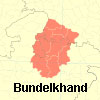(Info) Valorised and Real Status of Women in Bundelkhand

Bundelkhand
Status of Women
Valorised and Real Status of Women in Bundelkhand
Bundelkhand's history has many valiant women figures. Historical incidents of sati are also celebrated in folklore and popular history as examples of women 'daring' to take extreme steps 'to save their honour' (read about sati shrines).
However such reverence bears no relation to the actual status of women.
As in most other rural parts of the country, women in Bundelkhand's villages toil from dawn to dusk - cooking, working in fields, grazing cattle, collecting dung, collecting water, collecting firewood, doing manual labour at construction sites - and their contribution is not realised.
A study by Suman Manju of the Indian Grassland and Fodder Research Institute, Jhansi, found that on average farm women in Bundelkhand worked for 8.75 hours a day, whereas men worked for only 4.72 hours [Manju].
When they work for wages, women get lower daily wages. This is an unchallenged norm; in the entire Bundelkhand region, there is no strong and extensive women's rights movements, although many small, localised efforts exist.
(Notable amongst women-led initiatives is Khabar Lahariya - Bundeli for 'News Waves' - a fortnightly rural newspaper written, edited, illustrated, produced and marketed by a group of women in Chitrakoot and Banda districts).
Domestic violence is common in Bundelkhand and largely uncontested. Among the forms of violence practised are literal demonstrations of the phrase naak katwana - the woman's nose is chopped off.
Women from SC groups are also vulnerable to sexual assault exercised by upper caste men.
A 2004 nine-state study of violence against women, supported by Oxfam (India) Trust, reported this narration of an SC woman from Chhatarpur district [Kriti, p 27]:
I work as an agricultural labourer. My husband does not work at all…My two elder sons and two daughters are married but I still have three young children to think about. I also rear chicks to supplement my income. Last year Raghavendra [name changed] came to my house at 7 pm and demanded that I sell chicken to him. He is a thakur by caste and lives in the village. I told him that I have already promised the chicken to someone else and even taken the money in advance from that person. He did not pay any attention to me and took the chicken, without paying for it. He then came to my house again the same night at 2 am with two other men. I was sleeping with my husband and children. He shouted at me and said that the chicks have flown back to my house. I said how could that happen when you have already eaten it. He got angry and started beating my husband. The other men with him were armed. They were carrying axes. They then tied up my husband and dragged me away from home towards the field. On the way they tore off my clothes. I did not have any clothes on me. Two men pulled me from each side and they kicked and punched me when I resisted. I was crying and shouting for help. But no one came out to help me. As they were dragging me, Raghavendra saw another woman who had come out to defecate. He tried to take her also, but her husband was standing nearby. He called out for help so Raghavendra and others left the woman and hurried away from them taking me with them. They took me near a tree at the outskirts of the village. They kept me there for the entire night and the next day. I had scratches and marks all over my body…I was bleeding profusely…I begged them to let me go. Finally my husband came looking for me with two policemen. When they saw the policemen with my husband, Raghavendra and his men fled…This man had raped three-four women before he raped me. The women were all from the dalit community…Some years back he had used bottles and sticks to rape a woman…This man is an animal. Once he gets drunk he loses all sense…There are only three or four thakur families in this village. All other families belong to scheduled castes or other backward castes but no one does anything about this man. No one protests because they are all scared of him.
There is no data on how many such cases take place in Bundelkhand - and we have no way of knowing how many such cases go unreported - but some indication can be got from state-wise figures.
According to a January 2008 report by Shuriah Niazi of the Womens News Network, in 1,300 days - from Dec 7, 2003 to June 30, 2007 - 1,217 gang rapes were reported in Madhya Pradesh as per State Assembly records.
Of these, 362 victims were from SC groups, 310 were from ST groups, 381 were from the other backward classes and 169 were from the general category. In 726 cases, the victims were minors.
Efforts to raise women's status in Bundelkhand are stymied by:
-
low levels of female literacy
-
poor health condition of women
-
force of tradition and feudal values
-
lack of economic opportunities for women
A largely unrecognised issue is the large number of poor young widows struggling to survive in the region.
Courtesy : bundelkhandinfo.org
- Anonymous's blog
- Log in to post comments